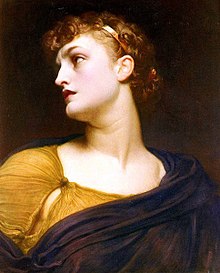
Antigone Page 3
We found 37 free papers on Antigone
Essay Examples
Overview
Sophie Scholl Prototype “Antigone”
Antigone
The decisions that Antigen made has not only impacted her future, but it has impacted all of those around her. It has changed the view of women in society . Croon asks, “And the man who dared to do this? ‘ (Lines 203208, Scene 1). It is vivo s that everyone believes that the crime…
Decisions and Behavior of Characters in Sophocles’ Antigone
Antigone
Antigone explores the conflicts arising from three demands that the human psyche must confront: the demands of religion (Zeus), the demands of the state (Thebes), and the demands of human instincts (Aphrodite). The character of Antigone exemplifies how strong beliefs and a deep sense of religious devotion can profoundly influence an individual’s thoughts and actions….
Concept of Power in Sophocles’ Antigone
Antigone
Religion
Sophocles
In the drama, Antigone, written by Sophocles, Antigone and Creon conflict a philosophical war covering with moral versus political power. In kernel, Sophocles demonstrates that Godhead will is more powerful than that of the state. Antigone’s side of the struggle is a more heavenly attack as opposed to the political locale taken by Creon. Antigone…
The Jean Anouilh’s Antigone
Antigone
Power Becoming Burdensome in Jean Anouilh’s Antigone One aspect of today’s society that many people do not take the time to recognize is the true strength that the leaders of our world must have, the pressure they carry, and the uncertainty they must struggle through every day. Although power is a privilege, the great responsibility…
Dialectic Journal on Antigone: A Passage by Antigone
Antigone
Journal
From Sophocles’ Antigone, written in about 442 B.C., and which centers on the Theban legend after the end of the reign of King Oedipus, one of the passages point to the center character, Antigone, when King Creon starves her to death for disobeying his command and offering burial rights to her brother, Polynices. At the…
Bloodwedding and Antigone Comparison
Antigone
A Sacrifice for Love Blood Wedding by Federico Garcia Lorce and Antigone by Jean Anouilh are similar in that they both have brave and admirable female antagonists and they both end tragically. The female characters, the bride in Blood Wedding and Antigone in Antigone, have several characteristics that are parallel. Both women revolt against the…
Dear Diary from Antigone
Antigone
Dear Diary, Ever since the fight for the throne between my two brothers, Eteocles and Polynices , nothing has been right. They fought for the throne, but the outcome came to be that they killed each other and the throne was left to my uncle, King Creon. My uncle is a selfish man who only…
Antigone Reflective Statement Research Paper
Antigone
Reflective Statement How was your understanding of cultural and contextual considerations of the work developed through the IO? The interactive orals were quite interesting as I could easily connect what was being said to the cultural and contextual considerations of the play Antigone. As a general background, one can possibly notice that Sophocles was more…
Sophocles Antigone: Situational Irony in Scene Three
Antigone
During a conversation between King Creon and his son Haimon, a statement was made. In the Grecian drama Antigone, Sophocles depicts a narrative in which the writer exposes the emergence of power, pride, and a refusal to accept corrections. The main character, Antigone, is portrayed as arrogant. By being a power-hungry male monarch, he shows…
Antigone Reaction Assignment
Antigone
Screen’s belief than an individual’s true nature can only truly be assessed when that individual is placed in a position of leadership. When someone is put into an important role like that in any society, he either fails or succeeds while doing the job. When one does not meet the expectations of his citizens, he…
| genre | Tragedy |
|---|---|
| description | Antigone is a tragedy by Sophocles written in or before 441 BC. Of the three Theban plays Antigone is the third in order of the events depicted in the plays, but it is the first that was written. The play expands on the Theban legend that predates it, and it picks up where Aeschylus' Seven Against Thebes ends. |
| characters | Creon, Antigone, Ismene, Haemon, Eurydice of Thebes, Tiresias, Sentry, Polynices |
| information | Playwright: Sophocles Brother: Eteocles Chorus: Theban Elders Date premiered: c. 441 BCE Tragic flaws: Her tragic flaw is that she has hubris, which is excessive pride, and that leads her to be unbending. Ironically, Antigone means unbending in Greek. Because she is unbending, she will not denounce her decision to bury Polynices. This angers CreonCreonIn Oedipus Rex, Creon is a brother of queen Jocasta, the wife of King Laius as well as Oedipus. Laius, a previous king of Thebes, had given the rule to Creon while he went to consult the oracle at Delphi. Location: setting (place) Antigone and Oedipus the King are set in Thebes, Oedipus at Colonus in Colonus (near Athens)., Age: Thus Antigone should be thought of as a 15 year old at most, and possibly as much younger ( 12 or 13). Her behaviour – wild and defiant is not unheard of in girls of that age. In fact it was recognised as a problem in Athenian culture, to be managed by a strange custom., |

